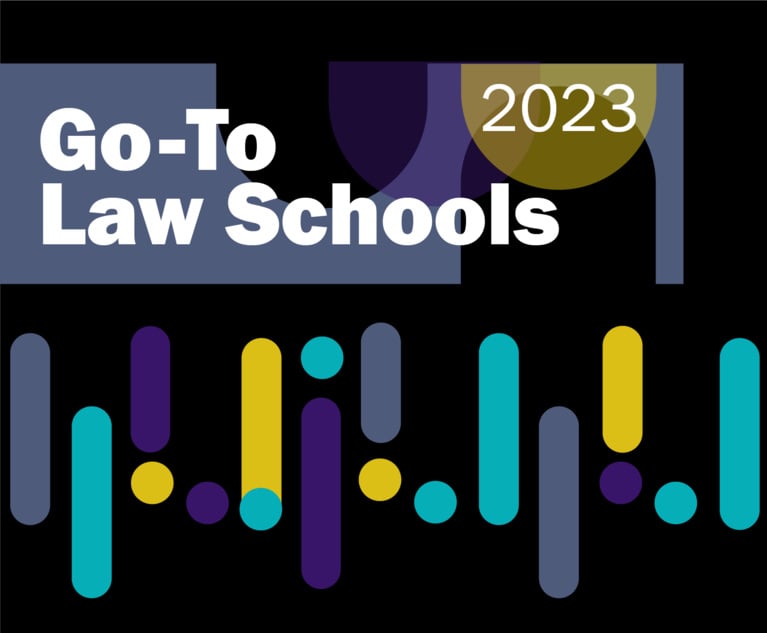Patricia King: Clinical Experience Is Vital for Law School Students
While there is a general agreement among students and members of the bar and bench that students need more practical training, there does not seem to be any movement on the horizon in that direction.
January 07, 2016 at 02:44 PM
5 minute read
In 2013, the Connecticut Bar Association created a Task Force on the Future of Legal Education and Standards of Admission to develop recommendations for including more practice-centered instruction for law students and to consider changes to the rules governing bar admission. In March 2015, the task force recommended that the private bar and law schools join forces to offer more opportunities for law students to gain practical experience, either through various efforts by members of the bar or through more experience-based courses included in law school curriculum. While there is a general agreement among students and members of the bar and bench that students need more practical training, there does not seem to be any movement on the horizon in that direction.
However, our neighbors in New York are a step ahead. In October, the New York Court of Appeals issued a request for public comment on proposed changes to the requirements for admission that would ensure that newly admitted attorneys have practical skills. A similar task force proposed five different pathways by which a bar applicant would be able to satisfy the practical proficiency requirement.
In a strongly worded comment, the Clinical Legal Education Association (CLEA) noted that two-thirds of law students believe that law school did not teach them the practice skills necessary to practice law, rendering their expensive education a poor value. The CLEA comment cites two studies whose results demonstrate the value of practical experience in law school. One survey of new lawyers working in nonprofit and corporate settings found that more than 83 percent rated legal clinics as “very useful” in preparing them for practice. In comparison, externships were rated “very useful” by 72 percent of those responding, and skills courses received the same rating from 48 percent of the new lawyers. In a second study of students preparing for the bar exam, 97 percent favored a law school model that included clinical experience.
This content has been archived. It is available through our partners, LexisNexis® and Bloomberg Law.
To view this content, please continue to their sites.
Not a Lexis Subscriber?
Subscribe Now
Not a Bloomberg Law Subscriber?
Subscribe Now
NOT FOR REPRINT
© 2025 ALM Global, LLC, All Rights Reserved. Request academic re-use from www.copyright.com. All other uses, submit a request to [email protected]. For more information visit Asset & Logo Licensing.
You Might Like
View All
University of New Hampshire Law School Launches Specialized Health, Life Sciences Program


2023 Go-To Law Schools: For Judicial Clerkships, Government and Public Interest Jobs, Small Schools Reign
6 minute read
Survey: Most New Law Students Are Unprepared for How Law School Debt Will Impact Them
Trending Stories
- 1Orrick Picks Up 13-Lawyer Tech, VC Group From Gunderson Dettmer
- 2How Alzheimer’s and Other Cognitive Diseases Affect Guardianship, POAs and Estate Planning
- 3How Lower Courts Are Interpreting Justices' Decision in 'Muldrow v. City of St. Louis'
- 4Phantom Income/Retained Earnings and the Potential for Inflated Support
- 5Should a Financially Dependent Child Who Rejects One Parent Still Be Emancipated?
Who Got The Work
J. Brugh Lower of Gibbons has entered an appearance for industrial equipment supplier Devco Corporation in a pending trademark infringement lawsuit. The suit, accusing the defendant of selling knock-off Graco products, was filed Dec. 18 in New Jersey District Court by Rivkin Radler on behalf of Graco Inc. and Graco Minnesota. The case, assigned to U.S. District Judge Zahid N. Quraishi, is 3:24-cv-11294, Graco Inc. et al v. Devco Corporation.
Who Got The Work
Rebecca Maller-Stein and Kent A. Yalowitz of Arnold & Porter Kaye Scholer have entered their appearances for Hanaco Venture Capital and its executives, Lior Prosor and David Frankel, in a pending securities lawsuit. The action, filed on Dec. 24 in New York Southern District Court by Zell, Aron & Co. on behalf of Goldeneye Advisors, accuses the defendants of negligently and fraudulently managing the plaintiff's $1 million investment. The case, assigned to U.S. District Judge Vernon S. Broderick, is 1:24-cv-09918, Goldeneye Advisors, LLC v. Hanaco Venture Capital, Ltd. et al.
Who Got The Work
Attorneys from A&O Shearman has stepped in as defense counsel for Toronto-Dominion Bank and other defendants in a pending securities class action. The suit, filed Dec. 11 in New York Southern District Court by Bleichmar Fonti & Auld, accuses the defendants of concealing the bank's 'pervasive' deficiencies in regards to its compliance with the Bank Secrecy Act and the quality of its anti-money laundering controls. The case, assigned to U.S. District Judge Arun Subramanian, is 1:24-cv-09445, Gonzalez v. The Toronto-Dominion Bank et al.
Who Got The Work
Crown Castle International, a Pennsylvania company providing shared communications infrastructure, has turned to Luke D. Wolf of Gordon Rees Scully Mansukhani to fend off a pending breach-of-contract lawsuit. The court action, filed Nov. 25 in Michigan Eastern District Court by Hooper Hathaway PC on behalf of The Town Residences LLC, accuses Crown Castle of failing to transfer approximately $30,000 in utility payments from T-Mobile in breach of a roof-top lease and assignment agreement. The case, assigned to U.S. District Judge Susan K. Declercq, is 2:24-cv-13131, The Town Residences LLC v. T-Mobile US, Inc. et al.
Who Got The Work
Wilfred P. Coronato and Daniel M. Schwartz of McCarter & English have stepped in as defense counsel to Electrolux Home Products Inc. in a pending product liability lawsuit. The court action, filed Nov. 26 in New York Eastern District Court by Poulos Lopiccolo PC and Nagel Rice LLP on behalf of David Stern, alleges that the defendant's refrigerators’ drawers and shelving repeatedly break and fall apart within months after purchase. The case, assigned to U.S. District Judge Joan M. Azrack, is 2:24-cv-08204, Stern v. Electrolux Home Products, Inc.
Featured Firms
Law Offices of Gary Martin Hays & Associates, P.C.
(470) 294-1674
Law Offices of Mark E. Salomone
(857) 444-6468
Smith & Hassler
(713) 739-1250










